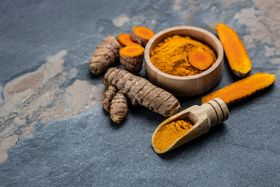Can Turmeric Shrink the Prostate?
Turmeric and its bioactive compound curcumin can be a great remedy to treat enlarged prostate. To learn more about the mechanisms behind it, Keep reading!
Published March 25, 2022.
The prostate is a small almond-shaped gland in men that surrounds the urethra, the tube that carries urine and semen out of the body. The prostate helps make semen. With age, the prostate starts to grow, which is called benign prostatic hyperplasia (BPH).
When it gets too large, it causes problems. It can squeeze the urethra creating lower urinary tract distress, a urine stream that is weak, trouble urinating, and frequent and urgent need to urinate—especially at night.
Amongst all the herbs used to shrink the prostate, turmeric for BPH is the most popular.
How Turmeric May Help the Prostate
Amongst the many bioactive compounds in turmeric, curcumin is the champion. Various clinical trials have indicated that curcumin is highly efficient in treating inflammatory conditions, skin diseases, metabolic disorders, and so on.
The anti-inflammatory and antioxidant property of turmeric is beneficial in slowing down the growth of the prostate and also lowering the risk of prostate cancer. Studies have observed that turmeric and prostate health have a direct correlation.
Curcumin significantly lowers prostate weight and prostate volume. It helps decrease certain growth factors in prostate tissue that keeps your prostate size in check (1).
The anti-tumor activity of curcumin also keeps the growth in check (2).
It is highly recommended to take turmeric with ginger and black pepper to increase its bioavailability.
How Much Turmeric Should You Use?
500mg of curcuminoids or half a teaspoon of turmeric powder is proven to be the most effective dose for your prostate. The turmeric dose for the prostate shouldn't cross one and a half teaspoons.
In one study, it was stated that curcumin in turmeric helps assist in reducing the risk of BPH by inhibiting the production of dihydrotestosterone (DHT), a derivative component synthesized from testosterone by 5-alpha-reductase that is one of the main contributing factors to an enlarged prostate.
Related Articles

Anju Mobin
8 Best Herbs for Brain Fog
Related Posts
Anju Mobin






